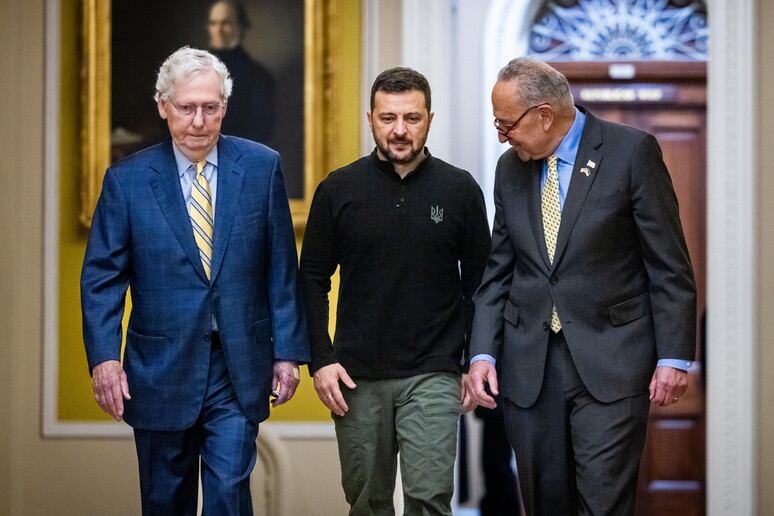When Ukraine’s President Volodymyr Zelensky first strode into Capitol Hill nearly two years ago, he was greeted with standing ovations, packed rooms, and a robust $50 billion military aid package. Fast forward to his recent visit, and the reception was starkly different—a far quieter affair, with only a handful of lawmakers behind closed doors, and a speaker of the House who pointedly avoided him. The tone has shifted dramatically – and so has the political climate.
Zelensky, once hailed as the face of defiance against Russia, is still Ukraine’s strongest advocate, but Washington’s enthusiasm for the war effort has dimmed. The Ukrainian leader, who was once able to cut through party lines with impassioned appeals for arms and assistance, now faces a harder battle to keep the U.S. onside, as The New York Times writes. With the war dragging into its third year, Zelensky’s ability to persuade American lawmakers has become as critical as the artillery his country depends on.
Ukraine is working through a hefty $61 billion military aid package, approved by Congress earlier this year, and the Pentagon is rushing to deliver it all before President Biden’s term ends. During Zelensky’s visit, Biden did announce another $7.9 billion in military support, including glide bombs, air defense missiles, and a Patriot battery. But once this latest round of support runs out, Ukraine’s future in the war will hinge on whether Congress is willing to keep the flow of weapons and aid alive.
Zelensky’s meetings on Capitol Hill were a study in contrast. His first sit-down was with a bipartisan group of around 20 senators, including Democratic leader Chuck Schumer and Republican Mitch McConnell. He then met with about a dozen House members, again from both sides of the aisle. But the usual fanfare was missing. Schumer and McConnell, who once clamored to show public support for the Ukrainian president, stayed away from the media, offering no statements, no grand gestures. Even Hakeem Jeffries, the House minority leader, chose not to raise the visit’s profile.
Zelensky’s arrival came just as both chambers of Congress had adjourned for the campaign season, leaving Capitol Hill half-empty and distracted. The lawmakers who did show up were those who have long backed military support for Kyiv. Senator John Cornyn, a Texas Republican, praised Zelensky’s leadership and the resilience of the Ukrainian people. “The will of the Ukrainian people to fight and defend their country has been something that I think most of us have found inspirational,” Cornyn said. But even Cornyn noted the wariness setting in, particularly around Ukraine’s requests for more advanced weaponry and faster delivery.
Zelensky’s push for longer-range missiles to strike inside Russia and accelerate arms shipments was heard, but the response was measured. Ukraine’s war effort, once framed as a moral imperative, is now viewed through a lens of practicality and fatigue.
Yet, the most significant cracks are forming among Republicans. While many GOP lawmakers have consistently backed Ukraine, others are beginning to push back, frustrated by what they see as the Biden administration’s political handling of the issue. Speaker Mike Johnson, a Republican from Louisiana, has been a vocal critic. His frustration reached a new level after Zelensky’s visit to a munitions factory in Scranton, Pennsylvania—a factory producing artillery shells critical to Ukraine’s defense. The visit, hosted by Pennsylvania’s Democratic Governor Josh Shapiro, was seen by some Republicans as a political move, staged in a crucial swing state without Republican involvement.
Johnson’s reaction was swift and sharp. In a letter to Zelensky, he accused the Ukrainian president of politicizing the war effort. “The appearance of favoritism in a politically contested battleground state, led by a top political ally of Kamala Harris, failed to include a single Republican,” Johnson wrote, calling it a “shortsighted and intentionally political move.”
The backlash didn’t end there. Some Republicans also pointed to comments Zelensky made to The New Yorker, in which he described JD Vance, the Republican vice-presidential candidate, as “too radical.” In the context of a looming election, his remarks have made it harder for Republicans to champion Ukraine’s cause without appearing to side with Democrats.
Even Zelensky’s supporters in the GOP voiced concerns. Cornyn remarked that the Ukrainian leader’s political moves had been a “monumental miscalculation.” Others, like Joe Wilson, Republican co-chair of the Congressional Ukraine Caucus, tried to soften the rhetoric, stating that the Scranton visit wasn’t meant to be political, though he conceded it “could be interpreted that way.”
With Trump, the Republican frontrunner, openly questioning the U.S.’s role in supporting Ukraine, Zelensky’s challenge is now not just on the battlefield, but in the shifting political landscape of Washington. Republicans who once stood firmly behind Ukraine are beginning to fracture, leaving Zelensky in an increasingly precarious position. Should Trump return to the White House, Ukraine’s war chest could face significant cuts.












